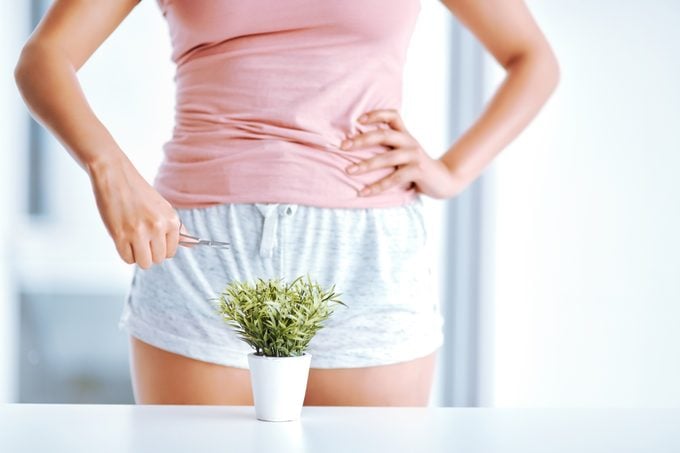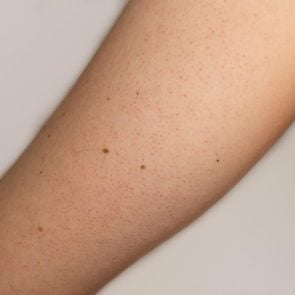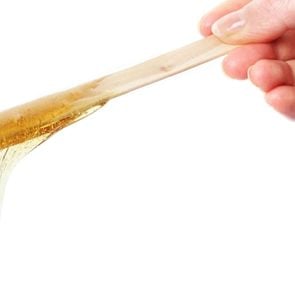Why Do We Have Pubic Hair? What to Know Before Trimming It
Updated: Jul. 25, 2024
Protection, comfort, and sex appeal—these are just some of the reasons we have pubic hair. Here's what to know and how to take care of yours.
All about pubic hair
Pubic hair gets a bad rap these days. In fact, research published in BMC Women’s Health suggests that women overlook the reasons why we have pubic hair faced with increasing pressure to laser, wax, or shave it away—and other studies show up to 87 percent of people adhere to a strict pubic hair grooming routine. There’s nothing wrong with a little landscaping down under, if that’s your preference. Yet the social influence to maintain a certain body image has the potential for both negative physical and psychological consequences, according to the researchers
Actress Cameron Diaz certainly thinks so. In fact, she loves her pubic hair so much that she dedicated a whole chapter to it—”In Praise of Pubes”—in her book The Body Book. (If you’re looking for more inspirational health and wellness books, experts say these are the most life-changing reads of the year.)
Diaz calls pubic hair a “lovely curtain of hair that surrounds that glorious, delicate flower.” She appreciates them on others as well, adding that a full bush makes people seem enticing and mysterious. “I figure there’s got to be a purpose for that hair,” she says.
And she’s right. There are some very compelling reasons that both men and women have pubic hair, says Sherry A. Ross, MD, an ob-gyn in Santa Monica, California, and author of She-ology: The Definitive Guide to Women’s Intimate Health.
No matter your preference, comfort is key—gynecologists say these are the most breathable underwear you can buy.
Why do we have pubic hair?
The evolution of pubic hair likely is due to three things: attraction, comfort, and protection, says Dr. Ross. But those aren’t the only ways it can benefit us. It boils down to these five factors:
Pheromones
You have scent glands in your groin, which produce pheromones, a chemical that is thought to trigger attraction in a potential sexual partner.
You can’t smell them like you would perfume, but it’s thought that your brain can sense them. Your dense pubic hair protects those glands and helps keep the scent appealingly potent.
Cushioning
All that skin-on-skin contact during sex can take a toll on your genital region, particularly when you’re in positions that require frontal contact, like missionary.
Pubic hair provides a little extra cushioning and padding during sex. It can reduce chafing and rubbing too. (While you’re at it, check out these 14 tips from sex therapists to spice up your bedroom.)
Protection
Well-fitting underwear shouldn’t rub, but if yours is stretched out or too tight, or if you prefer to go commando, your clothing can chafe your genitals.
Routine activities that require use of your pelvis, like cycling or other types of exercise, can also be rough on the sensitive genital areas.
Pubic hair works to provides a barrier between you and clothing and/or bicycle seats, helping minimize discomfort.
And this protection is something many take for granted. “One of the first things people notice after removing their pubic hair is that certain sex positions and activities are not as comfortable,” Dr. Ross says.
Cleanliness
It’s a myth that shaved genitals are cleaner than their hairy counterparts. In fact, the opposite is true, says Dr. Ross.
Clean pubic hair (more on that later) provides a protective barrier that can help prevent dirt, debris, and germs from invading sensitive areas.
Sex appeal
Everyone is different in what they are attracted to but Diaz isn’t the only one who likes the look of pubes.
The bare or barely there look is popular right now—likely due to the lack of pubic hair in porn, says Dr. Ross—but plenty of men and women find pubic hair attractive. It may be because it’s a visual sign of sexual maturity.
Get The Healthy @Reader’s Digest newsletter for what’s trending in health and wellness daily

How to care for your pubic hair
Pubic hair, just like any other hair on your body, can be at risk for lice, fungal infections, and gross germs.
It can also accumulate dirt and sweat, which may increase the risk of acne on your genitals.
That’s why it’s important to your health to keep pubic hair clean and well-maintained, says Grayson J. Guzman, MD, an ob-gyn with MomDoc Midwives in Arizona.
Pubic hair doesn’t require any extra care beyond how you wash your genitals (and yes, you should be washing the outside of your genitals).
A little soap and water in the shower is all you need to keep your carpet clean, hygienic, and ready for company, says Dr. Ross. Some people find that using a little hair conditioner makes their pubic hair feel softer.
When choosing a soap, pick a mild, hypoallergenic soap. It’s best to avoid dyes and fragrances on your sensitive areas, says Dr. Guzman.
If you do like to shave, wax, or trim, just make sure all the instruments are clean and sterilized before using them. Be gentle, as these methods can cause ingrown hairs, injuries, and infections. And note that it’s fine to choose a middle ground between totally bare and overgrown.
“You may want to just clean it up a little,” says Dr. Ross.
Grooming down there
From special shaving styles and waxed designs to dyeing and bedazzling, men and women have a lot of options for styling their pubic hair. But how do you know which are safe to try?
“Use this one simple rule: if it’s assumed to be safe for your face, it’s probably acceptable for your pubic area,” says Dr. Guzman.
He adds that it’s better to use temporary products, like washable dye or jewel stickers, than more permanent options.
If you do opt for permanent dye, make sure to cCheck the ingredients before using it a permanent dye. Popular lightening ingredients, including both bleach and hydrogen peroxide, can burn your sensitive skin. If in doubt, always go to a professional.
The special pain of the ingrown pubic hair
If you have pubic hair, then you’ve most likely had the uniquely frustrating experience of having an ingrown pubic hair down there. Pubic hair is more susceptible to this problem than other hairs on your body, says Dr. Guzman.
“One of the most common reasons I see for painful bumps in the genital area are ingrown hairs,” he says.
Pubic hair is characterized by its curly shape, and that tight coil makes it easier for the hair to burrow back into your skin, causing ingrown hairs. You may not feel them at all, or they may be painful, itchy, red or dark-colored, raised, and/or swollen.
If an ingrown hair isn’t bothering you, it’s fine to leave it alone. Chances are, it will heal itself. However, if it’s painful or in an annoying area, you can try removing the offending hair at home using tweezers and a hand mirror. When you’re finished, clean the area with soap and water. If it’s bleeding, you can cover it with a bandage.
If the area becomes swollen and painful, it’s likely your ingrown hair has become infected. This may require medical treatment. If it doesn’t go away within a few days, gets worse, or shows signs of infection—like redness, swelling, pain, or discharge—it’s time to call your doctor, Dr. Guzman says.
Well-fitting undies may help protect against infection and ingrown hairs. It’s one of the reasons to wear underwear.
To keep or not to keep
Pubic hair styling and maintenance are individual choices, and you can be healthy with or without it. However, there’s no medical reason to get rid of your pubic hair and some good reasons to consider keeping them around.
Never miss a beat on the latest health and wellness trends by following The Healthy on Facebook, Instagram, and Twitter. Check out these popular reads, too:






















